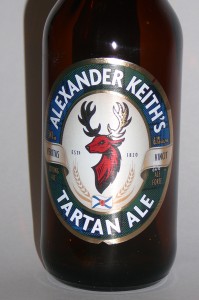 Last week I got a package in the mail. It was one of those packages I like – beer! I opened it and found, wrapped in burlap, a bottle of Alexander Keith’s Tartan Ale. For those of you not in the know, Alexander Keith’s has decided to launch a line of seasonal beer, I suspect because they finally figured out that these days beer drinkers like variety. The first was Harvest Ale, which did not make it out west. The second is Tartan Ale, and it is being given national release. Their reps sent along an advance copy of the beer for me (like what publishers do for book reviewers).
Last week I got a package in the mail. It was one of those packages I like – beer! I opened it and found, wrapped in burlap, a bottle of Alexander Keith’s Tartan Ale. For those of you not in the know, Alexander Keith’s has decided to launch a line of seasonal beer, I suspect because they finally figured out that these days beer drinkers like variety. The first was Harvest Ale, which did not make it out west. The second is Tartan Ale, and it is being given national release. Their reps sent along an advance copy of the beer for me (like what publishers do for book reviewers).
I am generally quite grumpy about Keith’s. I know they are standard macro-lagers, which is actually fine with me. My problem is they pretend to be something more. Claiming to be an India Pale Ale, a Witbier and such really bugs me because it misleads the public and undermines beer education. If you like pale lagers, I am not going to get in your way – everyone has the right to have what they like. But just don’t encourage people to think they like IPA just because they like Keith’s.
My other gripe with Keith’s is that it does the worst job of the big boys at copying craft styles. Its White is undrinkable and the Dark is easily surpassed by Rickard’s version. Are they even trying? The Tartan Ale claims to be a Scottish Ale (thank god they didn’t claim it to be a Scotch Ale). I must admit I stared at the newly arrived bottle with some skepticism.
Brave soldier that I am, I opened it anyway. And got more than I expected.
It is a dark copper beer with a thin head that offers very little lasting capacity. The aroma is sweet with caramel and sugary malt. It smells clean, with no esters and only a middling impression. The taste is mostly caramel and toffee, with some subtle earthy notes. Not much else going on in there. The finish is sweet, almost cloying. It lacks that touch of drying I expect from a Scottish Ale that makes the style more drinkable. It is also rather uni-dimensional, lacking a depth that I want. If I had to categorize it, I would call it a Scottish Light 60/ with the alcohol content of a Scottish Export 80/ (Note: for those of you unfamiliar with these styles, the Scottish brew the same beer at three different strengths, each progressively more complex, named for their historic price).
I didn’t mind it. Really.
I find myself intrigued by this beer in the same way I am intrigued by Rickard’s Dark. Neither really fit the style they claim to be, but both offer some real flavour and body in the beer. Is this a hint that the big boys have figured out you can make beer with flavour and make money from it? Or are they finally letting their brewing-side people play a little?
Either way this is the first Keith’s product which I would willingly accept a second bottle. Not necessarily if some craft beer were available, but I wouldn’t feel the need to switch to wine. This might be faint praise (and in their eyes it probably is), but it is honest. The beer didn’t turn me off, but I also know it could be better. Baby steps, my friends, baby steps.


March 14, 2011 at 10:27 PM
Hmm, have to try that! I too was somewhat impressed by Rickard’s Dark. i requested a pint with a very guarded optimism(having read Mark Suits’ brief review-‘letdown’ sums it up. But I actually ended up having a second glass-& No not just because I was chatting up Sara the cute blonde bartender. The beer to some extent reminded me of a honey brown style, I really quite enjoyed it for what it was.
March 15, 2011 at 8:11 AM
I tried the Tartan and while it was better than the IPA I wouldn’t go out of my way to have another, but would accept one if offered to me and there were no real crafty beers around. I found they bumped up the malts to give it that caramel/toffee character, but it was a one dimensional beer. I would have much preferred it if it had some fruity esters or some nice hop characteristics. All in all, this was quite the improvement from their standard beers, but still quite far from true craft beers.